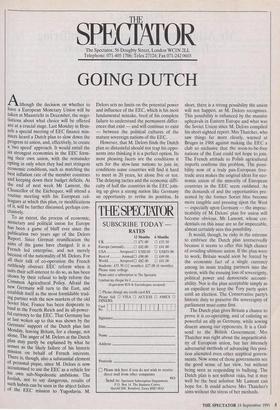The Spectator, 56 Doughty Street, London WC1N 2LL Telephone: 071-405
1706; Telex 27124; Fax 071-242 0603
GOING DUTCH
Although the decision on whether to have a European Monetary Union will be taken at Maastricht in December, the nego- tiations about what choice will be offered are at a crucial stage. Last Monday in Brus7 sels a special meeting of EEC finance min- isters heard a Dutch plan to slow down the Progress to union, and, effectively, to create a 'two speed' approach. It would entail the six strongest economies in the EEC form- ing their own union, with the remainder opting in only when they had met stringent economic conditions, such as matching the best inflation rate of the member countries and keeping down their budget deficits. At the end of next week Mr Lamont, the Chancellor of the Eichequer, will attend a routine meeting with his European col- leagues at which this plan, or modifications Of it, will be further discussed, perhaps con- clusively.
To an extent, the process of economic, monetary and political Union for Europe has been a game of bluff ever since the publication two years ago of the Delors Report. Since German reunification the alms of the game have changed. It is a French led enterprise, and not merely because of the nationality of M. Delors. For all their talk of co-operation the French ruthlessly obstruct EEC reform when it suits their self-interest to do so, as has been shown by their refusal to help reform the Common Agricultural Policy. Afraid the new Germany will turn to the East, and establish itself as the most forniidable trad- ing partner with the new markets of the old Soviet bloc, France has been desperate to bind in the Fourth Reich and its all-power- ful currency to the EEC. That Germany has at last woken up to this was shown by the Germans' support of the Dutch plan last Monday, leaving Britain,. for a change, not alone. The anger of M. Delors at the Dutch plan may partly be explained by what he senses as the likely failure of his historic mission on behalf of French interests. There is, though, also a substantial element of personal pique, since M. Delors is now accustomed to use the EEC as a vehicle for his own sub-Napoleonic ambitions. The foolish, not to say dangerous, results of such hubris can be seen in the abject failure of the EEC mission to Yugoslavia. M.
Delors sets no limits on the potential power and influence of the EEC, which is his most fundamental mistake, bred of his complete failure to understand the permanent differ- ences that exist — and will continue to exist — between the political cultures of the mature sovereign nations of the EEC.
However, that M. Delors finds the Dutch plan so distasteful should not trap his oppo- nents into thinking it is a perfect option. Its most pleasing facets are the conditions it sets for the slow-lane nations to join in; conditions some countries will find it hard to meet in 20 years, let alone five or ten. The delaying tactics and the economic diffi- culty of half the countries in the EEC join- ing up gives a strong nation like Germany an opportunity to revise its position. In
short, there is a strong possibility the union will not happen, as M. Delors recognises. This possibility is enhanced by the massive upheavals in Eastern Europe and what was the Soviet Union since M. Delors compiled his short-sighted report. Mrs Thatcher, who saw things far more clearly, warned at Bruges in 1988 against making the EEC a club so exclusive that the soon-to-be-free nations of the East could not hope to join. The French attitude to Polish agricultural imports confirms this problem. The possi- bility now of a truly pan-European free- trade area makes the original ideas for eco- nomic union of the minority of European countries in the EEC seem outdated. As the demands of and the opportunities pre- sented by the former Soviet bloc become more tangible and pressing upon the West — especially upon Germany — the iinprac- ticability of M. Delors' plan for union will become obvious. Mr Lamont, whose cre- dentials on thiS issue are so far impeccable, almost certainly sees this possibility.
It would, though, be risky in the extreme to embrace the Dutch plan Unreservedly because it seems to offer this high chance of avoiding ultimate union. If the plan were to work, Britain would soon be forced by the economic fact of a single currency among its main tradihg partners into the system, with the ensuing loss of sovereignty, political power and democratic account- ability. Nor is the plan acceptable simply as an expedient to keep the Tory party quiet until an election. The Conservative party's historic duty to preserve the sovereignty of parliament must come first.
The Dutch plan gives Britain a chance to prove it is co-operating, and of enlisting so powerful an ally as Germany, while sowing dissent among our opponents. It is a God- send to the British Government. Mrs Thatcher was right about the impracticabil- ity of European union, but her intensely adversarial methods of advancing this posi- tion alienated even other sceptical govern- ments. Now some of those governments see the good sense of her view, but without being seen as responding to bullying. The Dutch plan is not without risks, but it may well be the best solution Mr Lamont can hope for. It could achieve Mrs Thatcher's aims without the stress of her methods.


















































 Previous page
Previous page